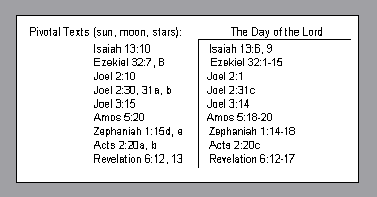

Paul wrote to the body of Christ, via Titus, of our blessed hope when he states that we are to be "...looking for the blessed hope and the appearing of the glory of our great God and Savior, Christ Jesus; who gave Himself for us, that He might redeem us from every lawless deed and purify for Himself a people for His own possession, zealous for good deeds" (Titus 2:13, 14 NASB). John echoes this theme when he wrote, "Beloved, now we are children of God, and it has not appeared as yet what we shall be. We know that, when He appears, we shall be like Him, because we shall see Him just as He is. And everyone who has this hope fixed on Him purifies himself, just as He is pure" (1 John 3:2, 3 NASB). This "blessed hope" is clearly the return of Christ for His church, the body of Christ. This too is the time of our redemption that frees us from this body of corruption (1 Cor. 15, especially verses 51-58). "And not only this, but also we ourselves, having the first fruits of the Spirit, even we ourselves groan within ourselves, waiting eagerly for our adoption as sons, the redemption of our body" (Rom. 8:23 NASB; cf., 2 Cor. 5:2-4). Therefore our blessed hope is Christ's return, which signifies our redemption!
But when is this "blessed hope" to be realized? Does Paul's teachings discount the previous teachings' of Jesus and all the prophets of the OT? The Bereans did not think so, as they used the OT scriptures to validate what was being taught to them (Acts 17:11). So is Paul teaching a different appearing than that taught by Jesus and the OT prophets? I think not; where does Paul state, or even hint of, a different appearing of Christ than what was taught by Jesus and the OT prophets? Nor does Paul's revelation in his later epistles, distinguishing the church from Israel, as the body of Christ, even discount his earlier epistles as to Christ's appearing for His church. This event of Christ's appearing is commonly known and associated with the "day of the Lord."
The phrase, "day of the Lord" occurs 23 times in the Bible; here is only one example:
"Now we request you, brethren, with regard to the coming of our Lord Jesus Christ, and our gathering together to Him, that you may not be quickly shaken from your composure or be disturbed either by a spirit or a message or a letter as if from us, to the effect that the day of the Lord has come" (2 Thess. 2:1,2 NASB; emphasis mine). Besides the 23 references to the "day of the Lord," there are numerous other allusions to this phrase (i.e., that day, the day, etc.)! Note, in the above verse, that the church's rapture is also associated with Christ's appearing on the "day of the Lord."
The "day of the Lord" is also associated with, and preceded by, a cosmic event (of the sun, moon and stars) as shown by the chart below:

From Jesus' own teachings in the gospel according to Matthew we read: "But immediately after the tribulation of those days THE SUN WILL BE DARKENED, AND THE MOON WILL NOT GIVE ITS LIGHT, AND THE STARS WILL FALL from the sky, and the powers of the heavens will be shaken, and then the sign of the Son of Man will appear in the sky, and then all the tribes of the earth will mourn, and they will see the SON OF MAN COMING ON THE CLOUDS OF THE SKY with power and great glory" (Matt. 24:29, 30 NASB). Therefore, we clearly see that the cosmic sign of the sun, moon and the stars, associated with the "day of the Lord," just precedes Christ's appearing on the "day of the Lord." At Christ's appearing, He will rapture the church as seen in the very next verse: "And He will send forth His angels with A GREAT TRUMPET and THEY WILL GATHER TOGETHER His elect from the four winds, from one end of the sky to the other" (Matt. 24:31 NASB). Paul concurs with this teaching in his letter to the Thessalonians: "For the Lord Himself will descend from heaven with a shout, with the voice of the archangel, and with the trumpet of God; and the dead in Christ shall rise first. Then we who are alive and remain shall be caught up together with them in the clouds to meet the Lord in the air, and thus we shall always be with the Lord" (1 Thess. 4:16, 17 NASB).
At Christ's appearing on the "day of the Lord," we see from Zechariah that really here begins again His program with a redeemed Israel that extends throughout the millennium on earth: "In that day...I will pour out on the house of David and on the inhabitants of Jerusalem, the Spirit of grace and of supplication, so that they will look on Me whom they have pierced; and they will mourn for Him, as one mourns for an only son, and they will weep bitterly over Him, like the bitter weeping over a first-born" (Zech. 12:10 NASB). Here too is when the 144,000 from the twelve tribes of Israel, are sealed (Rev. 7:1-8). At this same time we also see the raptured church in heaven (Rev. 7:9-17). These two events just follow the cosmic sign of the sun, moon and the stars associated with, and just prior to, the "day of the Lord" with His appearing (Rev. 6:12-17). Thus God's program begins with Israel here just as His program ends with the church as the body of Christ on earth. God always has a people on earth as a testimony to Himself, whether as the body of Christ or a redeemed Israel.
In conclusion, we can clearly see that Paul's teachings do not discount, but rather happily concur with, the teachings of Jesus and the OT prophets concerning our blessed hope, the rapture and redemption for the body of Christ. In rightly dividing the word of God, we must be careful not to cut it to pieces or we'll find ourselves in the error of reductionism. Paul's later prison epistles introduce us to the "great mystery," previously "hidden" (not before revealed), concerning the "new creation," the all-inclusive "body of Christ" in God's economy of grace (Rom. 16:25, 26; Eph. 1:9+10; 3:3-9; 5:32; Col. 1:25-27). Again, in Paul's later epistles, he here clearly never discounts the teachings of Jesus, nor the teachings of the OT prophets, nor does he even nullify his earlier epistle teachings. Paul's revelation enlarges upon and thereby emits a greater light as to the deeper purposes of God--never making void previous truths. If the rapture at Christ's appearing is not relevant to the church as the body of Christ, then Paul would have clearly so stated it in his later epistles; he does not! Indeed, our blessed hope in the appearing of Christ is our blessed hope and not a false hope thus made void.